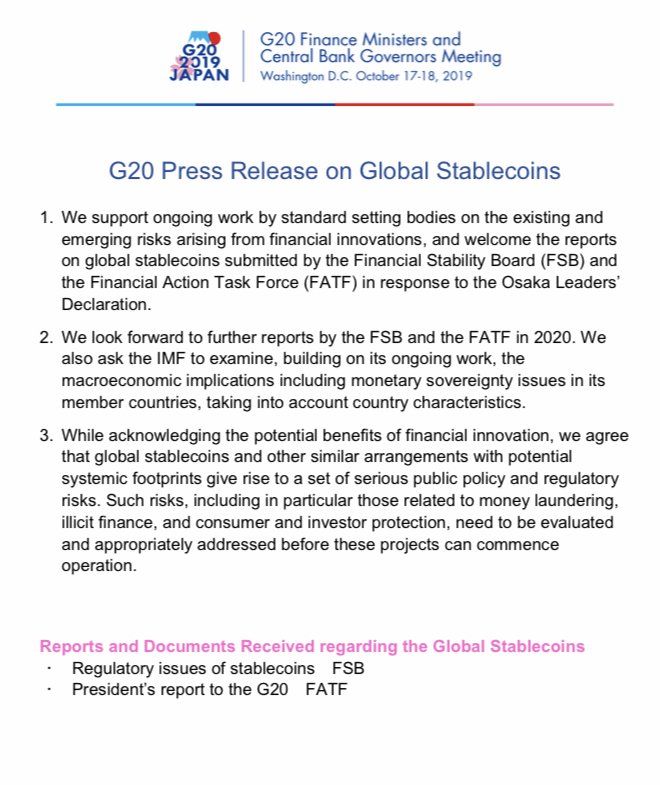Blog Layout
G20 Finance Leaders Agree to Regulate Global Stablecoins
PAR002_123 • Oct 21, 2019
G20 Finance Leaders Agree to Regulate Global Stablecoins
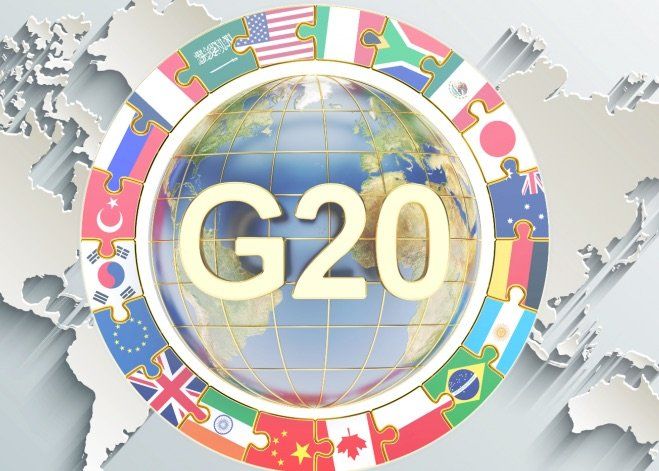
G20 finance leaders have agreed to impose regulations on global stablecoins, after a G7 working group warned that their issuance could threaten the world’s monetary system and financial stability.
“While acknowledging the potential benefits of financial innovation, we agree that global stablecoins and other similar arrangements with potential systemic footprints give rise to a set of serious public policy and regulatory risks,” reads a statement from the G20 finance leaders.
“Such risks, including in particular those related to money laundering, illicit finance, and consumer and investor protection, need to be evaluated and appropriately addressed before these projects can commence operation.”
The report from the G7 working group on global stablecoins is available at https://www.bis.org/cpmi/publ/d187.pdf
The G20 statement followed warnings from both the FSB (Financial Stability Board) and FATF (Financial Action Task Force), which were tasked with monitoring for existing and emerging risks in crypto-assets, and asked to advise on additional multilateral responses as needed.
A new FSB paper sets out the regulatory issues of stablecoins, saying: “The launch of stablecoin-type arrangements for domestic and cross-border retail payments with the potential to reach global scale could alter the current assessment that crypto-assets do not pose a material risk to financial stability.”
However, the paper acknowledges that global stablecoins used for cross-border payments and remittances by a large number of users in different countries could also provide benefits to the financial system and the broader economy.
“Harnessing those potential benefits, while containing associated risks for the financial system, requires adequate and comprehensive regulatory and oversight arrangements to ensure that any potential risks to financial stability and market functions can be identified and adequately addressed,” the FSB says.
To achieve the G20 objectives, the FSB says conduct a stock-tale of existing supervisory and regulatory approaches and emerging practices to determine whether they are adequate to address financial stability and systemic risk concerns associated with stablecoins, and report back to the G20 finance leaders on possible multilateral responses, if deemed necessary. A consultative report will be submitted in April 2020 and a final report in July 2020.
Meanwhile, FATF says stablecoins and the global networks and platforms they propose could “potentially cause a shift in the virtual asset ecosystem and have implications for the money laundering and terrorist financing risks”.
“There are two concerns: mass-market adoption of virtual assets and person-to-person transfers, without the need for a regulated intermediary. Together these changes could have serious consequences for our ability to detect and prevent money laundering and terrorist financing.”
According to FATF, both stablecoins and their service providers would be subject to the FATF standards either as virtual assets and virtual asset service providers, or as traditional financial assets and their service providers.
“They should never be outside the scope of anti-money laundering controls.”
FATF will continue to monitor stablecoins and consider issuing further clarifications on how the FATF standards apply to these emerging assets and their service providers. A further report to the G20 finance leadesr is expected in 2020.
Based on the FSB and FATF proposals, the G20 will debate how to regulator stablecoins.
The G20 has also asked the IMF (International Monetary Fund) to examine the economic implications, including monetary sovereignty issues, associated with stablecoins.
With regard to Facebook’s planned launched of a new stablecoin in June 2020 – the G20 leaders have agreed that “Libra should not be launched before concerns about risks are addressed”.
Libra has already suffered several setbacks in recent weeks, after Stripe, eBay, Booking Holdings, PayPal, Mastercard and Visa pulled out of the group behind the project.
FSB - Financial Stability Board
‘G20 Leaders, in the June Osaka Declaration ,noted that technological innovations can deliver significant benefits to the financial system and the broader economy. While they stated that crypto-assets do not pose a threat to global financial stability at this point, they also indicated the importance of monitoring developments and remaining vigilant to existing and emerging risks.
A recent development has been the announcement by private sector actors of their intention to launch stablecoin2-type arrangements for domestic and cross-border retail payments and remittances, with the potential to reach global scale (“global stablecoins”).
The term ‘global stablecoins’ refers to stablecoins with a potential global reach and the ability to rapidly scale in terms of users/holders of the crypto-asset.
The emergence of global stablecoins could be used for cross-border payments and remittances by a large number of users in different countries could provide benefits to the financial system and the broader economy by, for example, lowering transaction costs in retail payments, especially in cross-border situations, or facilitating financial inclusion due to the use of widespread end-user technology (e.g. smartphones) to initiate transactions. Harnessing those potential benefits, while containing associated risks for the financial system, requires adequate and comprehensive regulatory and oversight arrangements to ensure that any potential risks to financial stability and market functions can be identified and adequately addressed.’
(Reference: Financial Stability Board ‘Regulatory issues of stablecoins 18 October 2019’
G20 - Press Release on Global Stablecoins
(Reference: G20 Press Release on Global Stablecoins
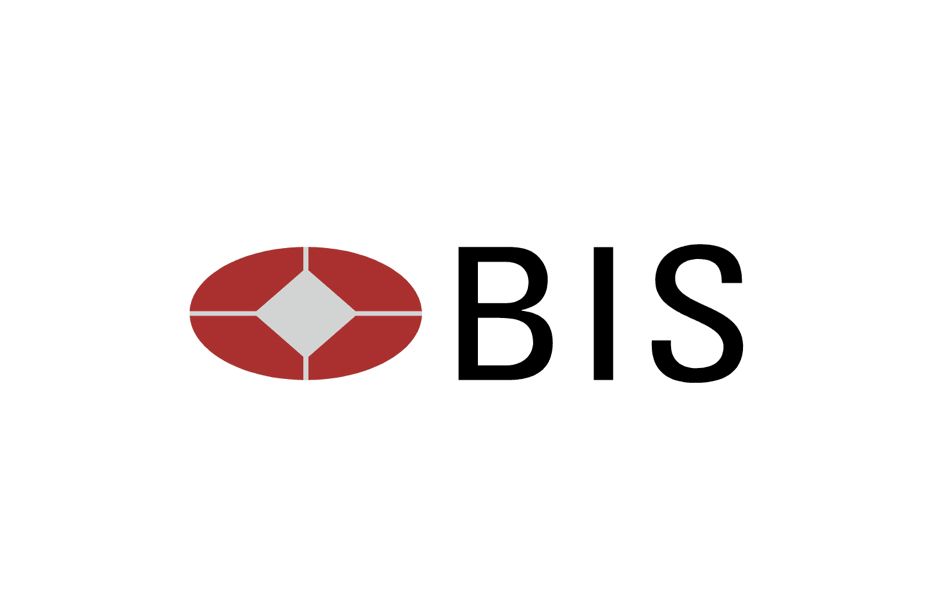
07 Mar, 2024
In response to the increasing prominence of global stablecoins (GSCs) and their potential implications for financial stability, the Bank for International Settlements (BIS) has introduced a comprehensive set of recommendations aimed at regulating and supervising these widely adopted digital assets.
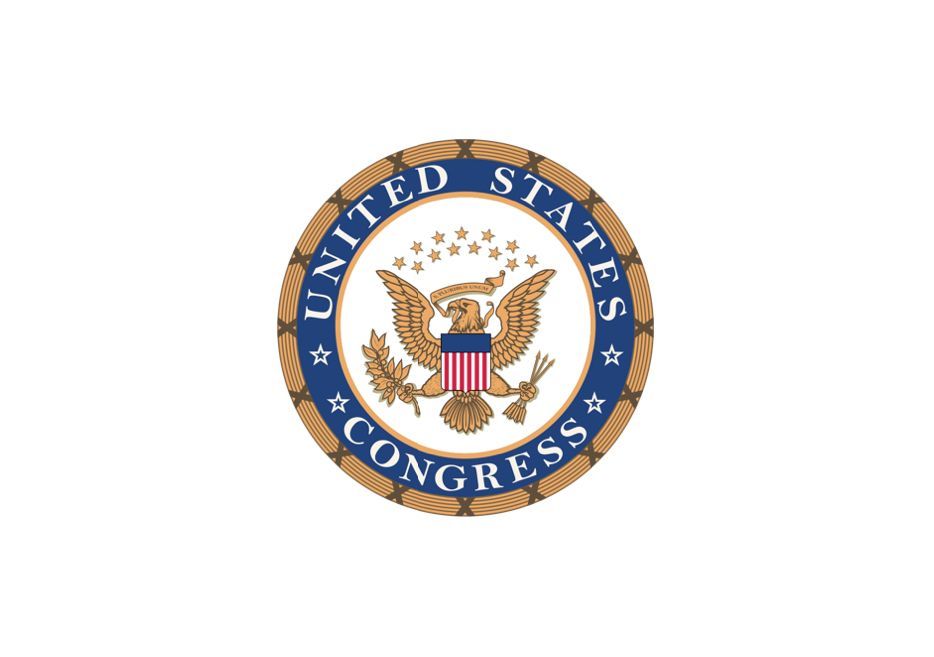
29 Jul, 2023
In a noteworthy development within the U.S. Congress, a long-awaited stablecoin bill made significant progress as it graduated from the House Financial Services Committee. However, the advancement of the Republican-backed bill was marred by a partisan clash and objections from the White House, leaving the committee chair, Patrick McHenry (R-N.C.), lamenting the missed opportunity for a bipartisan deal.

13 Jul, 2023
A new crypto oversight bill reintroduced by Senators Cynthia Lummis and Kirsten Gillibrand is making waves in the U.S. Senate. The bill proposes that crypto exchanges be overseen by the Commodity Futures Trading Commission (CFTC) rather than the U.S. Securities and Exchange Commission (SEC). Additionally, it calls for all stablecoin issuers to be regulated depository institutions. This bill represents a significant effort to establish U.S. regulation for the crypto industry and addresses the division of oversight between the SEC and CFTC.
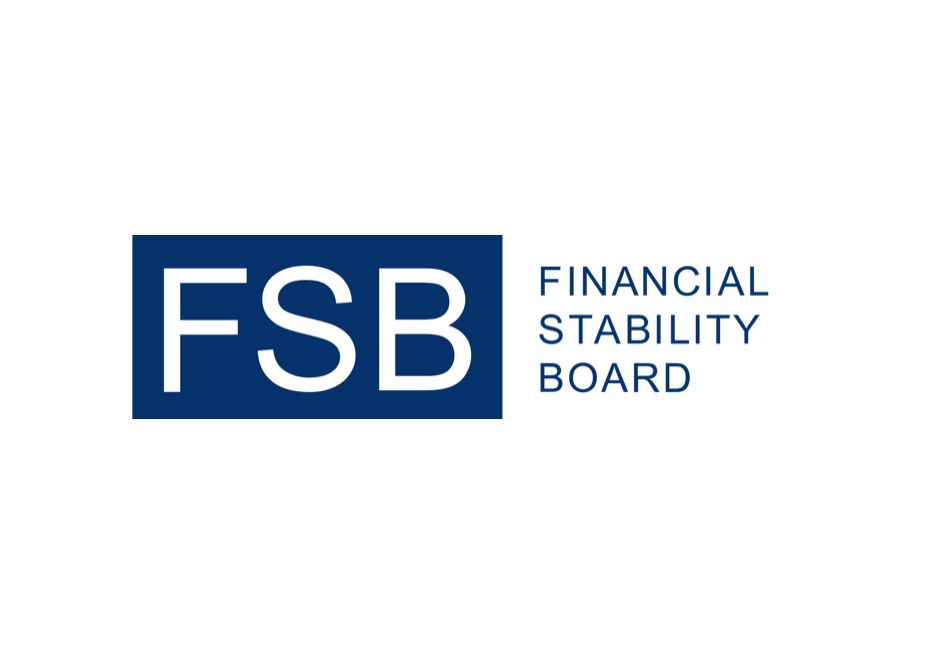
13 Jul, 2023
In preparation for the upcoming G20 Finance Ministers and Central Bank Governors meeting in India, Klaas Knot, Chair of the Financial Stability Board (FSB), has highlighted the recent banking turmoil and the FSB's commitment to learning valuable lessons from these events. In a letter addressed to the G20 officials, Knot emphasized the importance of addressing risks associated with crypto-assets and global stablecoin arrangements, as well as providing updates on efforts to tackle climate-related financial risks.
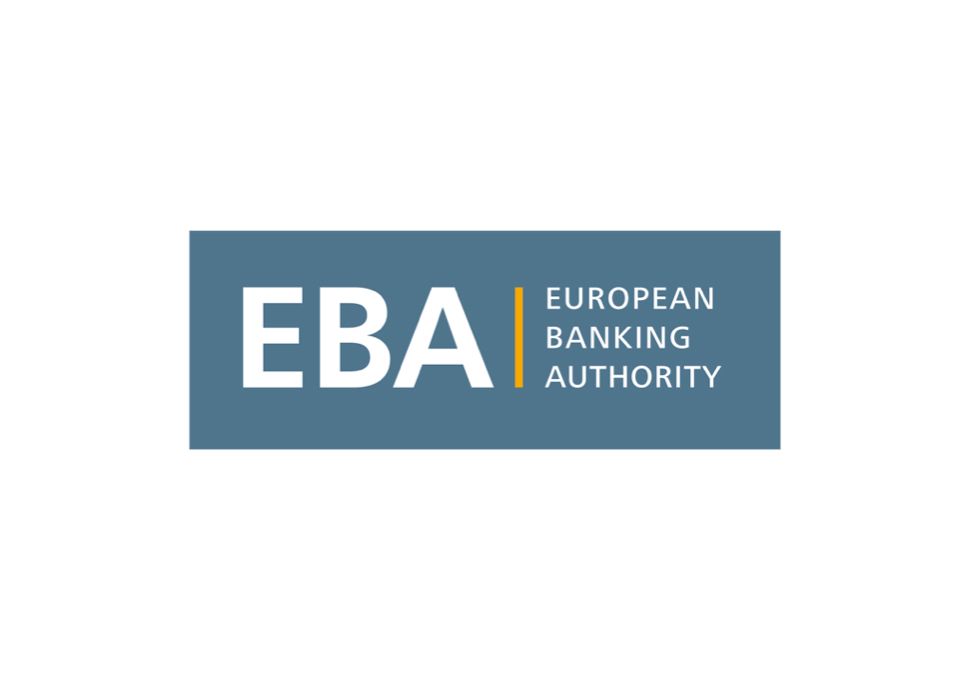
12 Jul, 2023
E-Money Token (Stablecoin) issuers have been advised to proactively prepare for the forthcoming regulations set by the European Union, according to the European Banking Authority (EBA). Although the rules of the Markets in Crypto Assets (MiCA) framework will officially come into effect in June 2024, the EBA emphasised the importance of early preparation to protect consumers and avoid disruptions for companies. The MiCA regulation includes provisions on governance, reserve requirements, and licensing for crypto wallet providers and exchanges.

12 Jul, 2023
According to a recent study by Juniper Research, the value of payment transactions made with stablecoins is predicted to surpass $187 billion by 2028, a significant increase from $53 billion in 2023. The study, titled "CBDCS & STABLECOINS: KEY OPPORTUNITIES, REGIONAL ANALYSIS & MARKET FORECASTS 2023-2030," highlights the rapid progress of stablecoins in the cross-border market, where they offer an alternative to slow, expensive, and difficult-to-track existing payment systems.
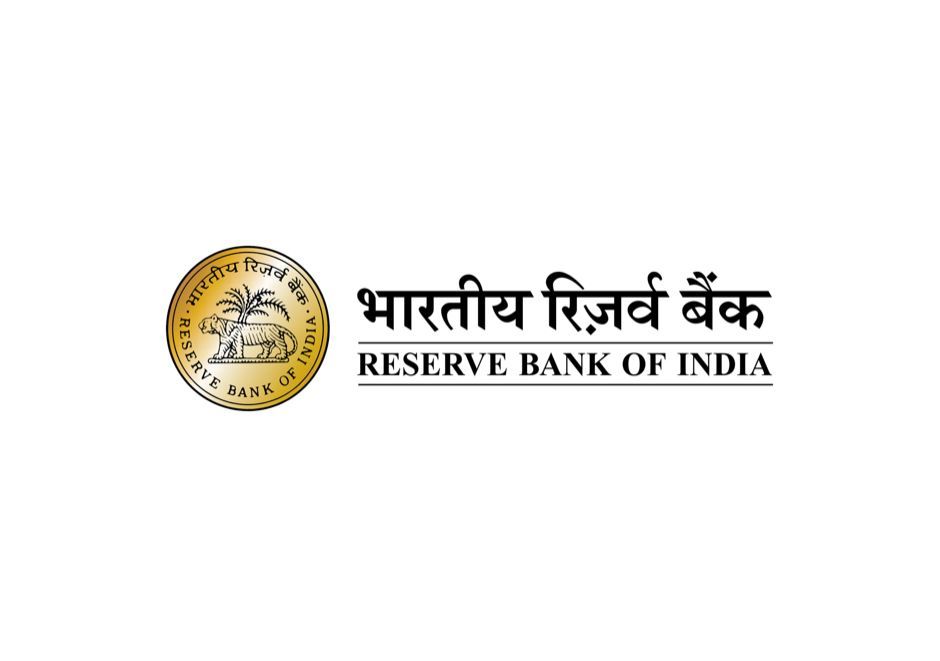
12 Jul, 2023
Reserve Bank of India (RBI) Deputy Governor T Rabi Sankar expressed India's concerns about stablecoins, emphasising their potential threat to policy sovereignty. In a speech at a banking event, Sankar called for a global financial system based on central bank digital currencies (CBDCs) issued by each country for settling global payments. He highlighted the importance of CBDCs in maintaining financial stability and independence, stating, "We should ideally aim for a global financial system which rests on central bank digital currencies (CBDCs) issued by each country to settle global payments, and not rely on stablecoins."
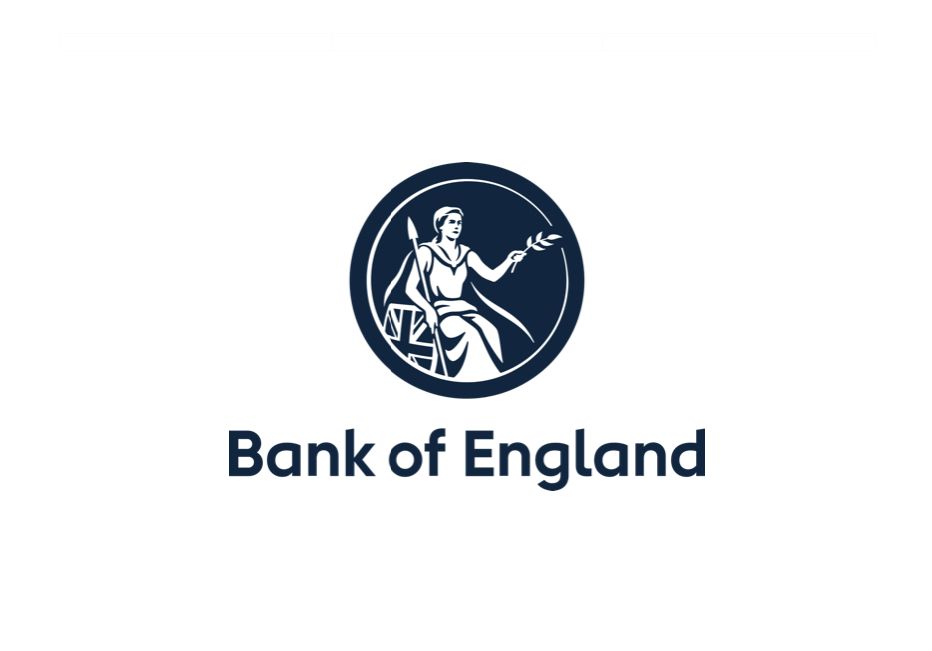
11 Jul, 2023
In a speech delivered on July 10, Bank of England (BOE) Governor Andrew Bailey shared his perspective on digital currencies, highlighting the potential of "enhanced digital money" while expressing reservations about cryptocurrencies and stablecoins. Bailey emphasised the need for regulatory oversight, stability, and usability in the evolving financial landscape.
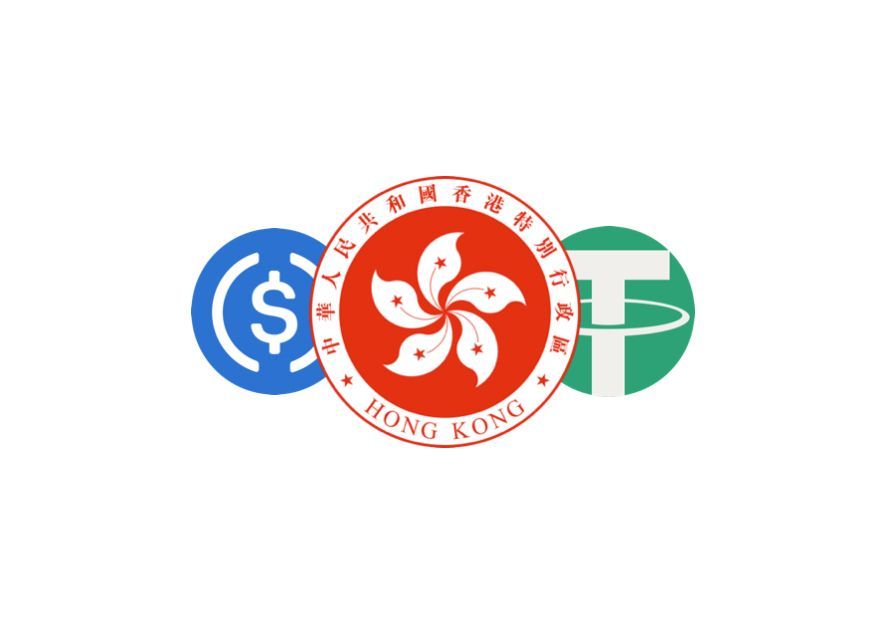
06 Jul, 2023
In a move that could reshape the global stablecoin market, Hong Kong is considering the launch of its own stablecoin, HKDG, to rival established stablecoins such as USDT and USDC. This groundbreaking proposal, co-authored by prominent figures in academia and industry, including Vice Chancellor Wang Yang and angel investor Cai Wensheng, aims to enhance Hong Kong's position in the digital currency landscape and assert its leadership in the blockchain sector.
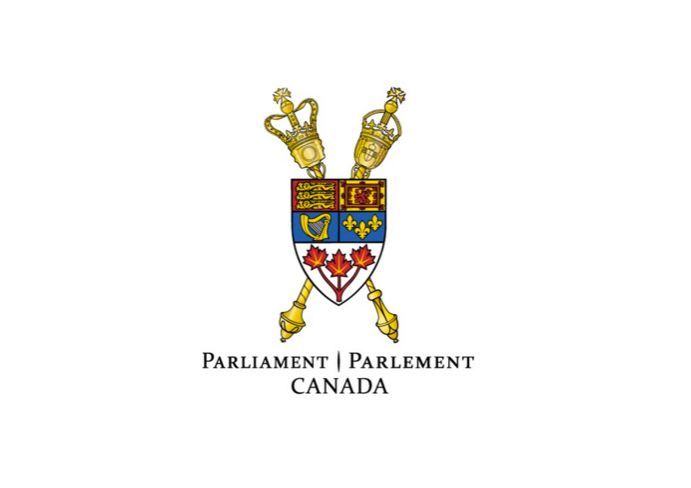
30 Jun, 2023
Canadian lawmakers have published a groundbreaking report that defends and supports the crypto industry, calling for the recognition of blockchain as a growing sector with the potential to drive job creation and economic growth. The report, which includes 16 recommendations, has garnered praise from industry participants, including leading cryptocurrency exchange Coinbase.
Disclaimer:
GlobalStablecoins.com is an informational website that provides news about coins, blockchain companies, blockchain products and blockchain events. Don’t take it as investment advice. Speak to an advisor before you risk investing in an ICO, Cryptocurrencies, Cryptoassets, Security Tokens, Utility Tokens, Exchange Tokens, Global Stablecoins, Stablecoins or eMoney Tokens. GlobalStablecoins.com is not accountable, directly or indirectly, for any damage or loss incurred, alleged or otherwise, in connection to the use or reliance of any content you read on the site.
Affiliate Disclosure / Sponsored Posts:
If a Sponsored Post contains any mention of a crypto project, we encourage our readers to conduct diligence prior to taking further action. GlobalStablecoins.com does not recommend that any cryptocurrency should be bought, sold, or held by you. Do conduct your own due diligence and consult your financial advisor before making any investment decisions.
GlobalStablecoins.com may receive compensation for affiliate links. Should you perform activities in relation to an affiliate link, it is understood that some form of compensation might be made to GlobalStablecoins.com. For example, if you click on an affiliate link, and sign up and trade on an exchange, GlobalStablecoins.com may receive compensation.
Before you invest in Cryptoassets you should be aware of the following,
Cryptoassets are considered very high risk, speculative investments.
If you invest in Cryptoassets you should be prepared to lose all your money.
All Sponsored Posts are paid for by crypto projects, coin foundations, advertising firms, PR firms, or other marketing agencies. GlobalStablecoins.com is not a subsidiary of any marketing agency, nor are we owned by any crypto or blockchain foundation.
The purpose of offering Sponsored Posts to our advertisers is to help fund the day-to-day business operations at GlobalStablecoins.com.
If you come across a Sponsored Post which you believe is fraudulent and/or “scammy,” please contact us and we will perform an immediate investigation.
© 2024
All Rights Reserved | GlobalStablecoins.com

